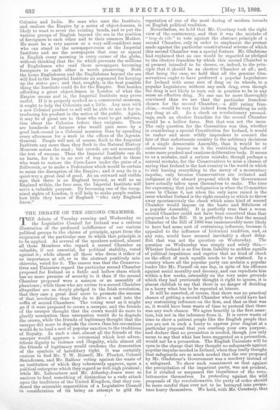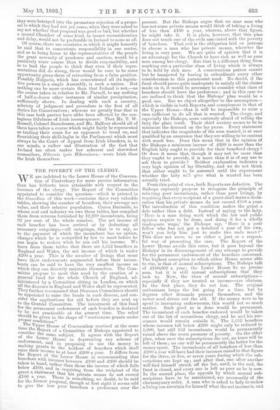THE DEBATE ON THE SECOND CHAMBER.
THE debate of Tuesday evening and Wednesday on the Legislative Council for Ireland was a curious illustration of the profound indifference of our various political groups to the claims of principle, apart from the exigencies of the particular case to which that principle is to be applied. As several of the speakers noticed, almost all those Members who regard a second Chamber as valuable, if not essential, for political stability, voted against it ; while almost all those who deem it either of no importance at all, or in the abstract positively mis- chievous, voted for it. The reason was that the Conserva- tives and Unionists regard the particular second Chamber proposed for Ireland as a futile and hollow sham which has no more promise of security in it than if the second Chamber proposed were a masque or an assembly of phantoms ; while those who are averse to a second Chamber altogether are so deeply pledged to the Irish revolution, that they care a great deal more to promote the success of that revolution than they do to drive a nail into the coffin of second Chambers. The voting went as it might go if it were proposed to crown a usurper, and the friends of the usurper thought that the crown would do more to glorify usurpation than usurpation would do to degrade the crown, while the friends of legitimacy thought that the usurper did more to degrade the crown than his coronation would do to lend a sort of popular sanction to the traditions of Royalty. In such a case, almost all the friends of the usurper would approve a ceremonial which lent adven- titious dignity to violence and illegality, while almost all the friends of legitimacy would condemn the desecration of the symbols of hereditary right. It was certainly curious to find Mr. T. W. Russell, Mr. Plunket, Colonel Saunderson, and Mr. Balfour voting against the waste of an institution of which they vehemently approve, upon a political enterprise which they regard as well-nigh piratical ; while Mr. Labouchere and Mr. Atherley-Jones were so anxious to lend something of distinction to a rude attack upon the traditions of the United Kingdom, that they con- doned the miserable superstition of a Legislative Council in consideration of its being an attempt to gild the reputation of one of the most daring of modern inroads on English political tradition.
Nevertheless, we hold that Mr. Courtney took the right view of the controversy, and that it was the mistake of " trop de zele" to vote against the abstract principle of a second Chamber, only in order to emphasise the protest made against the particular constitutional scheme of which this second Chamber was a special feature. Mr. Gladstone had explained that no one would be regarded as pledged to the elective franchise by which this second Chamber is at present intended to be chosen, or, indeed, to the prin- ciple that it should be an elective Chamber at all ; and, that being the case, we hold that all the genuine Con- servatives ought to have preferred a popular Legislature for Ireland with some sort of drag on its wheels, to a popular Legislature without any such drag, even though the drag is not likely to turn out in practice to be in any sense an effective drag. No one can be more thoroughly convinced than we are that the particular franchise chosen for the second Chamber,—a, £20 rating fran- chise,—would be very far indeed from furnishing us with any drag at all. As a check on revolutionary proceed- ings, such an elective franchise for the second Chamber would be a hollow farce. But that was not the issue. The only question for the Committee was this, whether in considering a special Constitution for Ireland, it would be rasher and more wildly imprudent to commit the fate of that unfortunate country to the arbitrary decisions of a single democratic Assembly, than it would be to endeavour to impose on it the restricting influences of some more prudent and cautious deliberative body. It seems to us a mistake, and a serious mistake, though perhaps a natural mistake, for the Conservatives to miss a chance of saying that Ireland is the last country in the world in which to risk leaving everything to the mercy of a momentary impulse, only because Conservatives are irritated and indignant at the absurd proposal which the Government have actually taken upon themselves to make. The time for expressing that just indignation is when the Committee come to Clause 6, not when the only issue raised is the issue whether Ireland is the right country in which to throw away spontaneously the check which some kind of second Chamber would impose on the haste and fitfulness of a popular Assembly. It is perfectly true that a worse second Chamber could not have been conceived than that proposed in the Bill. It is perfectly true that the second Chamber of the Bill of 1886 was immeasurably more likely to have had some sort of restraining influence, because it appealed to the influence of historical tradition, and, at any rate, would have secured inevitably a short delay. But that was not the question on Wednesday. The question on Wednesday was simply and solely this,— Whether Ireland is so free from liability to sudden squalls of political impatience and caprice that no kind of check on the effect of such squalls needs to be retained. In a country where all the popular party can acclaim a popular leader like Mr. Parnell on one day, in spite of his offences against social morality and decency, and can repudiate him within a few weeks, ostensibly on the very same grounds which they had previously thought it right to ignore, it is almost childish to say that there is no danger of deciding in a hurry what has to be repented at leisure. It will be asserted, of course, that there was no practical chance of getting a second Chamber which could have had any restraining influence on the first, and that as that was so, it would have been waste of time to pretend that there was any such chance. We agree heartily in the first asser- tion, but not in the inference from it. It is never waste of time to show a patient people like the English people that you are not in such a, hurry to express your disgust at a particular proposal that you overleap your own purpose, and declare that no precaution is needed, though you only mean to say that what has been suggested as a precaution, would not be a precaution. The English Unionists will be open to the charge that they thought no safeguards against popular impulse needed in Ireland, when they really thought that safeguards are so much needed that the one proposed by Mr. Gladstone's Government was a mockery instead of a safeguard. To show such resentment as that against the precipitation of the impatient party, was not prudent, for it rivalled or surpassed the impatience of the revo- lutionaries themselves. In protesting against the wild proposals of the revolutionaries, the party of order should be more careful than ever not to be betrayed into prema- ture hurry themselves. We hold, with Mr. Courtney, that they were betrayed into the premature rejection of a propo- sal to which they had not yet come, when they were asked to say not whether that proposal was good or bad, but whether a second Chamber of some kind, to insure reconsideration and delay, would not be preferable in Ireland to none at all. Of course, there are countries in which it might honestly be said that to concentrate responsibility in one centre, and so to bring home to the representatives of the people the great necessity of prudence and caution, would be a positively wiser course than to divide responsibility, and so to lead the people to think that even if their repre- sentatives did do wrong, there would be sure to be some opportunity given them of retreating from a false position. Possibly Bulgaria, which has concentrated all its legisla- tive powers in a single Assembly, is such a nation. But nothing can be more certain than that Ireland is not,—as the course taken in relation to Mr. Parnell, to say nothing of half-a-dozen other instances of similar precipitation, sufficiently shows. In dealing with such a country, sobriety of judgment and procedure is the first of all duties for Conservatives ; whereas we greatly fear that in this case both parties have alike been affected by the con- tagious fitfulness of Irish inconsequence. That Mr. T. W. Russell, Colonel Saunderson, and Mr. Balfour should all of them have taken a course which might fairly be represented as trailing their coats for an opponent to tread on, and flourishing their shillelaghs in the Parliament which must always be the Court of Appeal from Irish blunders, is, to our minds, a rather sad illustration of the fact that Ireland too often makes her soberest and shrewdest counsellors, Hibernis ipsis Hiberniores,—more Irish than the Irish themselves.



































 Previous page
Previous page